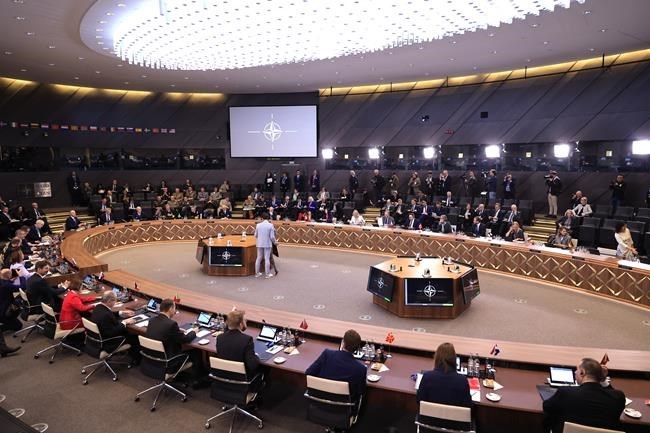Here is a roundup of stories from The Canadian Press designed to bring you up to speed on what you need to know today...
NATO alliance marks 75 years in Brussels
Brussels is playing host to foreign ministers from 32 countries this week to mark 75 years since the formation of the North Atlantic Treaty Organization.
As the alliance celebrates its anniversary, it's staring down the familiar threat of an unpredictable Russia.
It's also bracing for the prospect of another perilous situation that it has faced once before: a Donald Trump presidency.
Kerry Buck, a former Canadian ambassador to NATO, said Russia's invasion has forced the alliance to become stronger. European countries "have started to get a lot more serious about defence," she said.
"If the U.S. starts to downgrade its presence, I don't see NATO crumbling right away."
CSIS, diplomacy top brass at interference inquiry
The ongoing inquiry into foreign interference is set to hear today from the top brass of Canada's intelligence agencies and foreign service.
The Communications Security Establishment, which handles signals intelligence, will have its deputy head, Dan Rogers, appear.
He will be followed by David Vigneault, the director of the Canadian Security Intelligence Service, and three of his colleagues.
RCMP Commissioner Mike Duheme is slated to take the stand this afternoon, and the day is expected to end with the head of Global Affairs Canada, Deputy Minister David Morrison.
The officials will likely face questions about the flow of information within the government, with three of the biggest federal parties saying they were not adequately briefed about attempted meddling by foreign states.
MP pushing for 'Red Dress' Indigenous alert system
A Manitoba MP is trying to create an alert system to notify the public when Indigenous women go missing — an endeavour she hopes will lead to fewer deaths and more safe reunions with loved ones.
"This is a critical initiative," New Democrat MP Leah Gazan, who represents the riding of Winnipeg Centre, said last month as a House of Commons committee began studying her "Red Dress Alert" proposal.
"This is an initiative that will save lives."
Gazan's fellow MPs unanimously backed her motion last year declaring the deaths and disappearances of Indigenous women and girls a Canada-wide emergency. The motion also called for funding for a new alert system similar to those that exist for missing children and seniors.
Now, MPs are discussing with experts and stakeholders about how to implement such a system across the country.
Draft pronoun policy gave teachers discretion
Emails show an early draft of Saskatchewan’s school pronoun policy would have allowed teachers to use a child’s preferred identification if there was concern the student faced danger when parents were notified.
Premier Scott Moe's government announced the policy last year. It requires teachers to have parental consent when children under 16 want to change their names or pronouns. The move received widespread criticism, with many human rights groups and the province's advocate for children saying it violates rights to gender identity and expression.
More than 2,200 pages of documents and emails recently obtained by The Canadian Press under freedom of information laws provide insight into what provincial employees considered when developing the policy.
The heavily redacted emails show that starting around Aug. 10, employees were researching a similar policy introduced months earlier in New Brunswick.
Longer wait for surgeries compared to 2019: report
Patients in all provinces are waiting longer for hip and knee replacements, cancer surgeries and other priority procedures than before the COVID-19 pandemic, national data shows.
A report released Thursday by the Canadian Institute for Health Information says that's the case even though more people underwent those procedures between April and September 2023 compared to the same months in 2019.
The institute's latest data looks at wait times for hip and knee replacements, hip fracture repair, certain cancer surgeries, as well as radiation therapy.
The data shows that 66 per cent of hip replacement patients had surgery within the recommended time frame of 26 weeks compared to 75 per cent in 2019, even though the number of procedures rose by 18 per cent.
As for knee replacement surgery, 59 per cent of people had the operation within that time frame, compared to 70 per cent before the pandemic.
Plans underway to lift stranded orca out of lagoon
A rescue effort that involves lifting a killer whale calf out of a remote tidal lagoon off northern Vancouver Island could happen within the next two weeks.
Federal Fisheries Department officials, the area’s Ehattesaht First Nation and marine mammal rescue experts say they’re convinced the only way to save the two-year-old orca calf is to risk hoisting it from the tidal lagoon near Zeballos, B.C.
Paul Cottrell, a marine mammal co-ordinator with the department, says rescue crews will attempt to place the young whale in a sling and lift it to the open ocean.
He says the plan then involves placing the orca calf in a large net pen in the ocean where its health can be examined and the chances of it meeting its family pod are greatest.
---
This report by The Canadian Press was first published April 4, 2024
The Canadian Press




